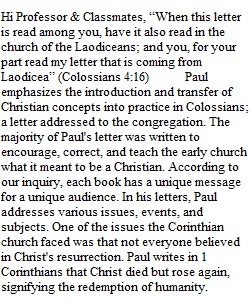


Q Discussion Topic One of the most important points to remember when reading the New Testament letters is that they are situational -- written by specific people to specific people in particular circumstances. And yet from the earliest days of Christianity the letters were passed around and read by others (see Colossians 4:16). What is is about the letters that make them applicable to people in different circumstances? How might that explain their continued use by Christians today? Is such usage legitimate, in your view? Why or why not?
View Related Questions